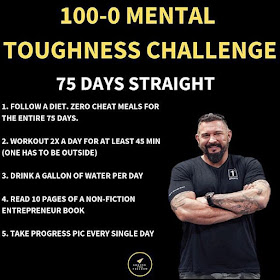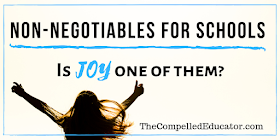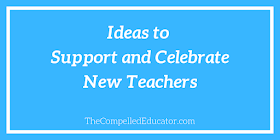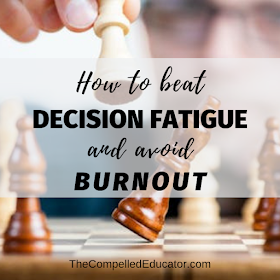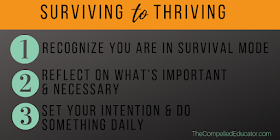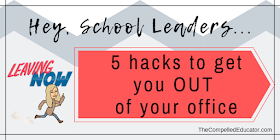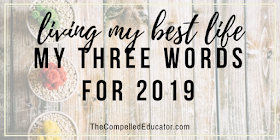Reflection is such an important part of the learning process. There was a time in my life when I was all about speed and moving forward... getting to the next thing... checking it off... completing the next task.
As I've gotten older and wiser, I've learned to focus on the balance of slowing down to go faster. I make it a priority to make time to reflect on what's been learned or how a skill was executed and what needs to be learned to be and do better.
December is a natural time for reflection for many of us. We reflect on our outgoing year as we plan for the new one. We ask ourselves: How did it go? How did I do? What did I learn and what do I need to learn? What do I need to do less of and what do I need to do more of?
Each year since 2014, as I reflect I decide on three words to guide me through the next year. This is a practice I learned from Chris Brogan, and one that has proven to be beneficial to me both personally and professionally.
Here's what Chris writes about choosing your three words:
Choose any three words you feel will guide you forward. I can tell you a few things about this:
- Don’t make it a phrase. “Publish the book” is a terrible choice. “The” is wasted.
- Try to make the words actionable. “Expand” is better than “bigger.”
- The more utilitarian the word can be, the better. These words have to be your compass.
- Stick with the 3 words all year. Every time I’ve changed one a month or two later, the year mucks up. I can’t explain it. But I can report it.
- Years where I’ve tried “fancy” words with layers of meaning, I lost the thread. Use plain words, maybe.
- BUT the words don’t have to mean anything to anyone but you. Don’t worry about explaining them.
My 3 words for 2019 were Practice, Execute, and Be.
Practice is about doing the daily work and getting better at something, while Execute is about facing fears and "pushing the button." Both words were important to me in 2019, but the one that I am most pleased with is how I used Be to guide me throughout the year.
From my blog post about Be:
It's about letting go of the need to achieve and filling the space with acceptance.
It's about embracing peace and being fully present for myself and others.
It's about having faith and love and knowing that I am who I am and that I am enough.
There was a lot that I said "no" to in 2019, and in doing so I was able to say "yes" to other things. This was a huge lesson for me, and one that I will take into the new year and the rest of my life. At times, it was extremely hard, because my nature is to go-go-go and be action driven. While it may seem like a year of unproductivity (is that a word?), it was a year of inner work that I needed to do in order to go forward with strength, joy, and resolve.
"I'm learning to love the sound of my feet walking away from things that were not meant for me." - Anonymous
As I reflect on the year I ask myself, "What has had the greatest impact and how can I do more to amplify that?" My mission is to encourage and empower others along their journeys, and I'm excited to do more of that in 2020. I've chosen three words as my guideposts for the year, and I'm excited to share them with you.
In April of 2018, I turned 50 years old. I was feeling old, soft, and not at all like the college athlete I once was. I bought myself a birthday present; it was a diet template from RP Strength. I had seen the amazing transformations on Instagram and wanted to give it a shot.
On the Monday after turning 50, I started the diet template and I followed it for 4 months and lost 15 pounds. It wasn't the weight loss that was my greatest accomplishment. The battle that was won was a mental one. It was sticking with something and seeing it through, even when it was challenging and emotionally draining.
Once school started, I got off the diet plan a bit and working out got less consistent. Now here we are about a year later and I'm ready for a new challenge. On January 6, I'm going to start the #75hard challenge. It will require great consistency to complete it.
For the challenge, you have to do 75 days straight. If you miss a day, cheat on a day, or don't fulfill the parameters of the challenge, you have to start over. I'm ready for a mental challenge that will also challenge me physically, and I'm planning to journal during the challenge so that I can reflect on my journey after the fact.
You can check out Andy Frisella on Twitter or Instagram, and check out the hashtag #75hard on both social media channels.
If you're doing this challenge already or want to start on January 6th with me, I would love to have the accountability partners!
The second word I've chosen for 2020 is Empower. As I reflected on 2019 and thought about what impact I want to have in 2020, my commitment is to be very intentional about my mission to empower others.
How do I define "empowering others"? I want to help other people believe in themselves by encouraging and equipping them with what they need to be successful. I want to see potential in others, find the gap, and help them acquire what they need to reach their potential. By empowering others, I will give them an opportunity to lead and help them to advance.
1. Those closest to us - family and friends
2. Those we work with - bosses, employees, and colleagues
3. Those we interact with in our daily lives - bankers, people in stores, stakeholders, and others
I don't want to overlook any opportunity to make a person feel validated and important, and I will create opportunities to share my wisdom (from mistakes I've made and lessons I've learned) and help others to uncover their awesomeness.
The third word for 2020 is one that I've been working on for most of my adulthood. :-) Growing up, my parents didn't talk to us about money. In fact, I still don't know very much about investing and I'm just learning how to really BUDGET my money. While I've never been person to spend extravagantly or on luxury items, I'm in a place where I want to save as much money as possible for investments, emergencies, and retirement.
I've been reading and following bloggers for a long time who write about frugal living and ways to create and stretch a budget. It's almost like a game I want to win or a treasure hunt to be solved, and I'm finding ways to decrease spending and increase income. I've been more like the person on the bench, though, enjoying the close-up view of the game, and now I'm ready to get IN the game. (Put me in coach!) I also recognize that my focus for 2020 on CONSISTENT will also be valuable in making budgeting successful in the new year!
I've been a fan of Dave Ramsey for a long time, but I could never make his envelope system work. Starting last week, I finally used the envelope system for groceries, and I plan to continue into the new year. Jordan Page is another person I learn from, and she explains her envelope system here. (Have you ever tried the envelope system?)
I also found out about an awesome app called Ibotta. It's like having digital coupons on your phone. It's easy to use - you simply take a picture of your receipt after shopping and you get credit for the amount of the coupon. Once you reach $20, you can transfer the money into your PayPal account or redeem as gift cards. I use it every time I shop, and if you would like to try it you can use my referral code, FTNDMAB, or click HERE to sign up.
I rarely clip coupons anymore (unless they're digital and matched on Southern Savers), but using the app and knowing exactly how much I'm saving allows me to put it away for the goals I've set for the year.
If you have any suggestions on making a budget work, I would love to hear them!
I hope these words have inspired you to create and share your own words for 2020. If so, please share them in the comments or on Twitter or Facebook.



